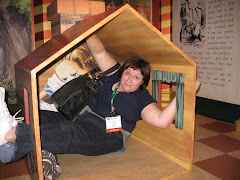Today is Blog Action Day. The topic is poverty. Blog Action Day is about getting bloggers to discuss one issue, to change the conversation and get people talking. I'm so on board with that. So a celeb blog (like Perez, which yes I read, don't judge me) could discuss Brangelina and others who are attempting to make a difference in the world. A blog about politics can discuss policies and such that can help. But what can a blog about museums discuss?
So, here are some ideas, off the top of my head...with some links.
The Tenement Museum has amazing community programs that help address poverty through dialogue and education. The most powerful programs target school children. One program leads students through a discussion of class bias, and another teaches about substandard housing, and encourages students currently living in substandard conditions to report violations to the housing authority. These programs empower people to seek ways out of the cycle of poverty and oppression.
The Workhouse, in the UK, chronicles a solution from the past. While many of us would shudder at the idea of the workhouse today, we cannot forget that the minds behind the idea meant well. Programs help visitors relate past and contemporary issues of poverty and welfare.
One program idea I've had for a while would involve working with groups like Spatulatta or Young Chef's Academy to teach kids and families to create easy, healthy, cheap meals. Food is expensive, and increasingly so. Parents dont have time or energy to cook. My own spouse grew up with this model. Mom's tired from working overtime. Food is expensive, and there are only two of them, so, its cheaper and easier to hit McDonalds than to make a meal. The problem there is that you set up kids for a lifetime of drive-thru dining - which leads to nutritional deficiencies, high cholesterol, diabetes, obesity and overall poor health. Museums, while teaching basic nutrition, should help teach families about budgeting, cooking small meals that can be reheated, and making healthy snacks. They should help families embrace local markets and learn to clip coupons.
In the same vein, many museums are located in urban areas, but areas with green spaces. Most museum campuses have some sort of green space available. How great to turn an unused patch of land into a community garden? Families can work their patch to plant veggies that they can then harvest and eat. Too many tomatoes? The museum can teach the science of canning or freezing. Or better yet, partner with a food bank and donate the proceeds.
Many museums host resource fairs. The Children's Museum of Indianapolis hosts an annual back to school festival. This festival offers visitors a chance to have vision and hearing screenings done, as well as get basic immunizations. All at low or no cost. In addition, we partner with Backpack Attack to distribute school supplies to over 20,000 children in our local area.
Offer classes - as a children's museum we tend to focus on kids, but parents need classes too. We have recently begun hosting basic finance classes. We also host computer classes through our local library branch. Offer babysitting certification. Teach parenting skills to young parents. Offer resources for foster and adoptive parents. Offer opportunities and respite for those caring for elders.
Discounts - no one should ever be barred from your museum because they cannot pay. If they will not, thats one thing, but if they truly want to come, there should be a way. Offer programs, opportunities, free days, etc, to allow everyone to have access.
Most importantly though, museums can help by working at the roots of poverty. Help your visitors understand that poverty affects people in every city in the world. Help children and families recognize consumerism and the problems it causes. Help them understand that people living in poverty are not lazy, nor are they stupid. Help them understand that barriers to education cause a cycle to exist. Stop promoting the "pull yourself up by your bootstraps" mentality that if you want something enough you can do anything. Stop promoting the myth of the meritocracy. Start the conversation about why this isnt true. Help visitors appreciate the opportunity to learn, to get good health care, and to have a hot meal and warm bed. Help grow compassion and understanding. Help them name the prejudices and biases that keep people locked in poverty. Help empower them to seek justice and stand up to those who would keep the cycle of poverty going. Show examples from the past and connect them to the present and future. Bring about understanding.
Museums educate. That's what we do. We can host free nights and give things away until we are blue, but unless we educate people - both those in poverty and those who believe they will never be touched by it (especially those who believe they will never be touched by it) then we will not break the cycle.
OK, soapbox done. Carry on.
